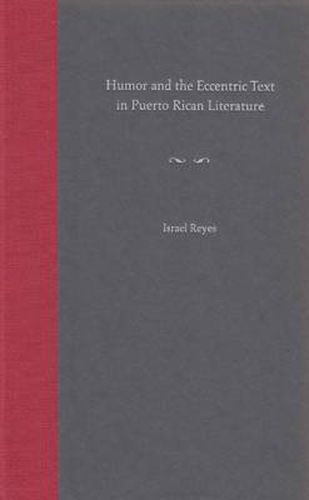Readings Newsletter
Become a Readings Member to make your shopping experience even easier.
Sign in or sign up for free!
You’re not far away from qualifying for FREE standard shipping within Australia
You’ve qualified for FREE standard shipping within Australia
The cart is loading…






Puerto Rican writers from the island and mainland have long used a variety of comic genres and forms to affirm an autonomous national identity and resist cultural hegemony and assimilation. The use of self-reflexive humor has allowed these writers to produce
eccentric texts
that reflect not only on their own textuality but also on their role as an intervention in the literary discourse on national identity. Reyes analyzes the works of Nemesio Canales, Luis Rafael Sanchez, Ana Lydia Vega, and Pedro Pietri to argue that their works resituate the parameters of national identity by blurring the lines between the subject and object of humor, the inside and outside of the text, and the here and there of the diasporic Puerto Rican nation. Framing his discussion in the context of Latin American, Latino, and Caribbean traditions, Reyes argues that humor and the eccentric text reimagine Puerto Rican national identity from the perspective of incongruity. He demonstrates how, through self-reflexive humor, these writers expose the many incongruities in Puerto Rican national identity yet also explore the relationship between author and reader. While demonstrating the genre’s own instabilities, Reyes argues, humor in Puerto Rican literature negotiates incongruity and allows for a national identity to emerge from multiple centers of articulation.
$9.00 standard shipping within Australia
FREE standard shipping within Australia for orders over $100.00
Express & International shipping calculated at checkout
Puerto Rican writers from the island and mainland have long used a variety of comic genres and forms to affirm an autonomous national identity and resist cultural hegemony and assimilation. The use of self-reflexive humor has allowed these writers to produce
eccentric texts
that reflect not only on their own textuality but also on their role as an intervention in the literary discourse on national identity. Reyes analyzes the works of Nemesio Canales, Luis Rafael Sanchez, Ana Lydia Vega, and Pedro Pietri to argue that their works resituate the parameters of national identity by blurring the lines between the subject and object of humor, the inside and outside of the text, and the here and there of the diasporic Puerto Rican nation. Framing his discussion in the context of Latin American, Latino, and Caribbean traditions, Reyes argues that humor and the eccentric text reimagine Puerto Rican national identity from the perspective of incongruity. He demonstrates how, through self-reflexive humor, these writers expose the many incongruities in Puerto Rican national identity yet also explore the relationship between author and reader. While demonstrating the genre’s own instabilities, Reyes argues, humor in Puerto Rican literature negotiates incongruity and allows for a national identity to emerge from multiple centers of articulation.